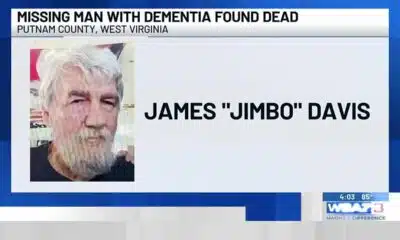News from the South - North Carolina News Feed
Mission Hospital released more than 100 bodies before legally required review • Asheville Watchdog
Since 2021, Mission Hospital has released at least 111 bodies to funeral homes before a legally required medical examiner’s review, according to a list of issues related to the hospital’s handling of deaths compiled by Buncombe County medical examiners and obtained by Asheville Watchdog.
The list includes people who died of gunshot wounds, drug overdoses, choking and falling bricks. Some of the bodies had to be returned to the hospital from funeral homes as far away as Georgia. Some were already buried.
Buncombe medical examiners shared their list of morgue concerns with Mission executives and the state’s Office of the Chief Medical Examiner (OCME) as far back as January 2021, according to emails obtained by The Watchdog. In July that year, North Carolina Chief Medical Examiner Dr. Michelle Aurelius wrote Mission a letter that flagged concerns about unreported bodies, cited state law, and offered training for hospital staff. It is unclear whether the letter was sent.
Years later, bodies continue to leave the hospital without legally required examination, including six in 2025.
“We have communicated” with HCA Healthcare, Mission’s corporate owner, “repeatedly without resolution,” Dr. Sharon Sweede, a medical examiner, wrote in an email last June to the state’s chief medical examiner.
The Watchdog sent Mission Health spokesperson Nancy Lindell several detailed sets of questions. She did not address the bodies that medical examiners said were improperly released or Mission’s response to their list of concerns.

Mission’s responsibilities, she said, are limited to storage as well as basic administrative and clerical duties, “according to applicable laws and regulations.”
In response to some questions, Lindell sent a statement from Dr. Melissa “Red” Hoffman, who oversees the hospital’s Office of Decedent Care, previously known as the Office of Decedent Affairs, or ODA.
“As a trauma surgeon, a hospice doctor, and someone who has survived multiple losses, I genuinely recognize how important Decedent Care is for patients’ families and for our community,” Hoffman said. “I continue to work closely with Mission providers and nurses (including ongoing one-on-one education) and remain in touch with many funeral home directors, the Buncombe County Register of Deeds and the Buncombe County Medical Examiner, all in an effort to improve Decedent Care throughout the Mission Health system.”
Hoffman said she is working with the state on improvements to its Database Application for Vital Events, a death certificate system, “which I believe will solve some of our ongoing issues.”
State law requires a review by medical examiners of deaths that are sudden, unexpected or unexplained, including those occurring in correctional facilities or police custody. Medical examiners determine whether a death was the result of sudden, unexpected, violent, or suspicious circumstances. They attend death scenes, provide a report, and complete death certificates in these cases, and their work is crucial to public health by helping to track disease outbreaks and trends such as suicides and drug overdoses.
But the law lacks enforcement authority or consequences for people responsible for reporting deaths — including hospital employees, physicians and law enforcement — if they fail to notify medical examiners, The Watchdog found.
The Office of the Chief Medical Examiner under the state’s Department of Health and Human Services “does not have oversight or enforcement authority,” NCDHHS spokesperson Summer Tonizzo said.
In North Carolina, counties must provide or contract for facilities to store and inspect bodies needing medical examiner review. Mission operates the morgue for Buncombe and Madison counties, which under state law is “under the direction of” the county manager, Tonizzo said.
The Office of Chief Medical Examiner “is not the authority or enforcement agency for improper decedent release at hospitals,” she said.
“County Medical Examiner decedent storage is required by state statute (G.S. 130A-381),” Tonizzo said. “A county board of commissioners is required to adopt ordinances or resolutions in order to execute duties imposed by the legislature (G.S. 153A-12). The county manager is required to ‘see that the orders, ordinances, resolutions, and regulations of the board of commissioners are faithfully executed within the county’ (G.S. 153A-82).”
“The OCME is aware that locally, there has been tracking of matters outside the control of the medical examiner system that may impact a county medical examiner’s ability to perform ME functions.”
NCDHHS spokesperson Summer Tonizzo
Tonizzo said, “The OCME is aware that locally, there has been tracking of matters outside the control of the medical examiner system that may impact a county medical examiner’s ability to perform ME functions.”
Buncombe County spokesperson Lillian Govus said that, “Outside of a criminal act, the county does not have oversight,” and said there was nothing about enforcement in its municipal code. Buncombe County’s local agreement with Mission for morgue services also says nothing about enforcement.
‘HCA has not communicated with any of us’
Mission operated the county morgue smoothly for years until 2021, when HCA, which had purchased the hospital two years earlier, restructured the Office of Decedent Affairs, according to former employees, medical examiners and emails obtained by The Watchdog.
The restructuring created confusion for nurses, chaplains, lab workers and others, and generated complaints from medical examiners even before changes to staffing were complete.
In February 2021, Sweede sent an email to the OCME outlining her concerns about the morgue.

“At least two outside bodies have been left in the morgue with no identification,” Sweede wrote. “One who died in the ER by gunshot wound to the head was sent to a funeral home in Georgia without calling the Medical Examiner (me). … HCA has not communicated with any of us Medical Examiners about changes.”
Sweede also shared the list she and others had started, a live Google Sheet updated regularly, in the email. “Enclosed is a link to a list of issues that LMEs [local medical examiners] have identified when it comes to Buncombe County – Mission Hospital,” OCME staff attorney Ashton Roberts wrote to Aurelius, the chief medical examiner, on May 13, 2021. “For context, Jeffrey has alerted me that the hospital is often not properly alerting MEs to ME jurisdictional deaths.”
Jeffrey Leach is a medical examiner trainer who sometimes works in Buncombe County.
“Maybe there needs to be a reach out to the hospital to remind them of their statutory duty to notify the MEs,” Roberts said in the email.
A month later, Sweede again contacted the OCME, attaching the updated spreadsheet.
“As you can see … the Mission/HCA problem is not getting better,” she wrote in a June 15, 2021, email. “We have discovered seven cases that were sent to funeral homes without calling the ME in June so far. There has been talk about educating the nurses and doctors. While this should be done I am quite sure it will not solve the problem.”

In July 2021, Aurelius wrote a letter to Mission.
“It has come to our attention that Mission Health has not been alerting local medical examiners in Buncombe County to deaths that would fall under our jurisdiction,” she said. “Pursuant to North Carolina General Statute § 130A-383 (a), Mission Hospital has a duty to notify a local medical examiner for any death that may be due to injury or violence, or is suspicious, sudden, or unusual. Statute necessitates that Mission Health properly train staff on when to notify a local medical examiner of a death.”
Aurelius offered training and education for Mission’s staff and ended the letter saying, “The OCME looks forward to continuing a fruitful relationship with Mission Health.”
The Watchdog asked NCDHHS and the OCME whether it sent the letter.
“NCDHHS believes the letter was sent via US Postal Service mail in 2021,” spokesperson Hannah Jones said. “NCDHHS has worked diligently to confirm but is unable to find evidence [the letter was sent], like electronic receipts to provide you.”
The Watchdog sent the letter to Lindell but she did not respond to questions about whether Mission received it or took Aurelius up on her offer.
Problems persisted for years. In 2024, Sweede again decided to flag concerns about improperly released bodies after The Watchdog contacted her and requested an interview.
“Mission staff and contractors are still failing to notify the ME about cases that clearly meet the ME criteria,” Sweede wrote in a June 24, 2024, email to Aurelius.
“I would be happy to be interviewed,” Sweede wrote. “Perhaps some reporting to the public would help provide incentive to improve.”

Lindell did not respond to a detailed list of questions about the emails between state officials and Sweede.
Lindell said Mission’s morgue has operated for years “as a free service to Buncombe and Madison counties because they do not have county morgues.
“In addition to taking on the responsibility of being the county morgue, Mission has also assumed the cost of contracting with a local mortuary service to handle interfacility transport, whether that be to a funeral home or to Atrium Health Wake Forest Baptist for an autopsy.
“I would add that without reimbursement from the counties, we also incur the added cost each year for a local funeral home to help with these services since they choose not to own and operate their own county morgues.”
A growing list of issues
By April 2025, the medical examiner issues spreadsheet had grown to 402 line items.
Nearly 200 were what medical examiners deemed as unnecessary calls to natural deaths that didn’t require a review.
But 111 were termed improper releases by the medical examiners: bodies sent to funeral homes before necessary medical exams were conducted. The list included labels such as “released without calling ME,” “jail death DOA, ER did not call me,” “HCA did not notify ME about this suicide,” “ME not notified by nursing staff,” “Doc signed as Natural,” or “was unidentified body in morgue.” It also included a synopsis about each.
These included:
- A case in which no medical examiner was called for the death of a child who choked on food and whose death certificate a doctor labeled “asphyxiation from choking”
- A fatal fall in which the body had to undergo a medical exam in Canton after it was already embalmed
- Several cases in which bodies were buried before medical examiners were notified
- A death in which a nurse missed a history of fentanyl use and the presence of the drug in the deceased’s pocket
- An instance in which a person was “crushed under a pile of bricks” yet a Winston Salem funeral home learned it was a medical examiner case only after the body was interred
- Several cases in which medical examiners had to call EMS to identify the dead, because bodies and body bags had no labels; in one case, a medical examiner noted, “Lab person said they didn’t have time to deal with that issue.”
The Watchdog sent Lindell the medical examiners’ findings, but she did not comment.
It was often funeral homes that would catch improper releases after discussions with the family or after seeing the body itself, the medical examiners and funeral home directors told The Watchdog.
In her June 2024 email to the OCME, Sweede noted “some improvement” in deaths not being properly reported to medical examiners since 2021. But she noted, “These were extremely rare before HCA took over.”
Medical examiners and former hospital employees told The Watchdog that the 2021 changes to the morgue and decedent systems led to bodies unidentified in the system, items belonging to the dead left in lockers for years, and a body being stored in a hazardous waste trailer for several days.
Medical examiner David Foster recounted a time in which he was faced with a “super angry” man whose mother’s body had been transported from Mission out of town before it could be examined. Foster traveled to the body to prevent it from having to be returned to the hospital.
“You know, it ain’t fair that she has to get loaded up and go back,” Foster said of the mother’s body.
Improper release has happened so often since HCA changed the decedent affairs system and medical examiners have become somewhat numb to it, even questioning the merits of the list.
“I used to get upset and get really angry because it just wasn’t right and somebody should have done better and somebody should care about it,” said Sweede, who has practiced medicine in the region for nearly 40 years including medical examiner work since 1988. “Now I’ve kind of gotten to where I understand they [HCA and Mission administration] don’t care. It’s apparently all about the money. This is the way it’s going to be. I’ll just do my job the best I can. And I’m very sorry for the families and sympathetic to them because it often causes delays.”
The importance of a medical history check
Four medical examiners who contributed to the list of issues spoke to The Watchdog.
Two, Amanda Staton and Paula Case, worked in Mission’s decedent affairs system as forensic nurses before the 2019 sale to HCA. The system was created and run by Larry McIntosh, who had nearly 30 years of experience with death care.
McIntosh’s system ran smoothly, medical examiners, forensic nurses, and lab technicians said.
In 2010, McIntosh trained Mission’s forensic nurses to work in the morgue. Kim Henson helped with that training. She worked in the laboratory department but had a funeral director license and had trained to manage morgue operations, she said.
McIntosh worked with the pathology group in the 1980s, and took over the morgue’s management as a contractor in 1994. He declined to comment.
Here’s how the system worked, Henson, Case, and Staton said:
When someone died at Mission, a nurse would call the ODA with the name of the deceased, their room number, and other information.
Forensic nurses would retrieve and log in the body to the morgue, which was staffed 24-7, including holidays. They would also check the deceased’s medical history to see if the death required a medical examiner’s review.
The medical history check is crucial, Henson said. “If you don’t have those records, you don’t know” whether a medical exam is needed, she said.
Henson, now a funeral director, said morgue workers also brought death certificates to doctors to sign. If a doctor doesn’t sign a certificate before a body goes to a funeral home, employees there may have to track the doctor down for a signature, causing delays in handling remains.
Forensic nurses pulled out of morgue operations
Hospital management pulled all forensic nurses out of morgue operations in early 2021 and gave their responsibilities to lab employees, nurse managers, and security guards, resulting in a less sympathetic and more faulty system, the medical examiners and Henson said.
“The forensic nurses were transitioned to the hospital’s nursing team where they use their forensic nurse training to focus on victims of violence and providing medical care to those victims at Mission Hospital and the Buncombe County Family Justice Center,” Lindell said.
Forensic nurses were already providing such services while they were working with decedents, Case said.
Emails obtained by The Watchdog show hospital leadership’s expectation that the nurse manager/lab process would run smoothly.
“[T]he ODA process will change as of 0700 on Monday, March 1,” then-Mission Chief Operating Officer Joseph R. Rudisill said in a Feb. 12, 2021, email of staff members. “At that time, the primary nurse will be responsible for completing the death packet and Security will be responsible for patient transport between the units and morgue. The House Supervisor will be able to provide any clarification around Medical Examiner process if needed. The Lab team will also support the process for releasing decedents to funeral homes.”
Several flowcharts shared with staff and obtained by The Watchdog show detailed explanations of how this process was supposed to work and how it was altered between mid-2020 and early 2021.
Twelve days later, Emergency Management Coordinator Mark Johnson sent an email to several staff members.
“Thanks for working so diligently to get Mission ready for the new Post Mortem Process Go-Live next Monday!” Johnson said in the email. “I believe we have made great strides in making this a smooth transition (fingers crossed).”
But medical examiners, former forensic nurses, and other employees say the transition was anything but smooth.
Sweede emailed Johnson several questions on Feb. 28.
“Who will be sure incoming bodies are properly labeled? Who will explain the process to families and accept their authorization for which funeral home to release to? Who will be training the nurses in the ER, ICUs and regular units about how to identify ME cases and call the ME? Should we report cases that have been improperly and illegally released without calling us to you or to someone else?”
An EmAIL FROM dr. Sharon Sweede to Mission Hospital
Emergency Management Coordinator Mark Johnson in February 2021
“Who will be sure incoming bodies are properly labeled?” she asked. “Who will explain the process to families and accept their authorization for which funeral home to release to? Who will be training the nurses in the ER, ICUs and regular units about how to identify ME cases and call the ME? Should we report cases that have been improperly and illegally released without calling us to you or to someone else?
“We medical examiners have already been asked all these questions by families and by funeral homes. We have had no answers to give them.”
Johnson emailed an offer for an in-person meeting. That happened, Sweede said, but none of the issues she mentioned were resolved.
The Watchdog sought comment from Johnson, but he did not respond.
Nurses were made responsible for some decedent operations, but they were confused and frustrated, said Case and a former Mission administrative assistant whom the hospital made its first coordinator of decedent affairs in spring 2021. She is no longer a Mission employee but works in health care and spoke on the condition of anonymity because she feared talking to the press might threaten future job opportunities.
“What they did, basically, was they tried to divide it up between the lab and nursing administration, but it really was not working,” she said.
Her new job was very hard, she said, because she had received no formal training.
“The way they [management] described it was you would have to talk to families and ask them their funeral home choices,” she said. “And I said to them, ‘I don’t know how to do that. I don’t know how to talk to grieving people. Like, I’m going to cry. I’m literally going to cry. I have never been trained in that.”
She is haunted by her memory of an 18-year-old woman who had died in a motorcycle crash.
“The parents didn’t know what to do, and there was nobody to really help them, guide them,” she said, sobbing. “And I couldn’t guide them and the lab can’t really guide them, and the nurses on the floor can’t guide them. So who’s supposed to help them?”
Three months after becoming decedent affairs coordinator, she resigned.
McIntosh departed in 2022, frustrated by the dismantling of the system he had designed, medical examiners said.

In fall 2022, HCA hired an outside contractor to run the morgue and decedent affairs, but its staff had no access to medical records, according to medical examiners.
The contractor is under the umbrella of the Penland family-owned series of businesses in Buncombe, of which there are at least three: Penland Family Funeral Home, LLC, Asheville Area Alternative Funeral and Cremation Services, LLC, and Asheville Mortuary Services, LLC.
Without such access, crucial information about bodies has been overlooked, medical examiners said. That’s not the fault of the morgue employees, Case said, but shortcomings throughout the decedent care system.
Lindell did not answer The Watchdog’s questions about the contractor and its operations, though she confirmed contractor employees don’t have access to medical records. No one from the Penland group of businesses responded to requests for comment.
A misplaced body and items
In some cases, bodies have been put in improper places.
In May 2023, a woman’s obese body was sent to the morgue, but there was confusion about how to proceed because of its size, a funeral home director and former lab scientist said.
The Watchdog is not identifying either because they feared publishing their names would potentially jeopardize their jobs and future employment opportunities.
A lab employee believed the body wouldn’t fit in the morgue or an outside cooler that is used when the morgue has reached capacity. Unsure what to do, she called the funeral home director for advice.
“And I said, ‘Take her, put her in the outside cooler. You’ll be fine,’” the director said.
Instead, the employee put the body in a hazardous waste trailer, the director said. It remained there for days until a funeral home brought a Ford F-150 with a boarded-up bed and transported it to a crematory that could accommodate its size.

The former clinical scientist said he smelled the body for days, until he saw a team transferring it from the trailer into the F-150 as he arrived for work.
“A lot of us were upset,” the scientist said. “We thought it was very disrespectful to handle human remains like that. But we were dealing with our own set of problems in the lab. I know for me, it was just like another straw that finally broke the camel’s back. I mention to people now about that as evidence of how poorly the hospital was being run.”
Lindell did not respond to questions about the incident.
Belongings are misplaced, too, medical examiners said.
Some have sat unclaimed in morgue lockers since at least late 2022, Case and Foster said. The medical examiners also told The Watchdog about belongings misplaced immediately after deaths.
Lindell did not answer The Watchdog’s questions about Case and Foster’s statements.
Foster noted morgue employees don’t open body bags and don’t know what items the deceased had in their possession.
Case said she now writes “belongings inside body pouch” on the bags to prevent those items from being lost.
Chaplains no longer see death packets
Medical examiners and a former hospital chaplain told The Watchdog that .
before the changes, families of the deceased had a more one-on-one relationship with hospital employees.

Former Mission chaplain Missy Harris said the pastoral care team once responded to every death. The team was responsible in part for handling death packets – documents with details about the patient that included contact information for next of kin and a list of the deceased’s belongings.
After the 2021 changes, chaplains were no longer allowed to access the packets, which were reserved for medical staff.
When asked about this change, Lindell said, “Our hospital chaplains play a vital role in providing emotional and spiritual support for families but are not involved in handling documentation due to HIPAA regulations. This allows chaplains to focus on providing comfort and spiritual support.”
Harris said the disorganization hurt her, her fellow chaplains and other staff.
“I will never forget the night I encountered a young security guard in tears after being called to a fetal demise,” said Harris, who quit in 2023 and is part of Reclaim Healthcare WNC, a coalition of healthcare professionals, elected officials and others advocating for Mission to sell itself to a nonprofit.
“He said he had no idea how to talk to the grieving parents and how excruciating it was for him to take the body of their child out of the room as the father wept in the hallway behind him.”
If you are a funeral home director or had a family member, loved one or friend who died at Mission and whose afterlife care was affected by delays, miscommunication or any other issues, we want to hear from you. Please email Andrew Jones at arjones@avlwatchdog.org. Call, text or use Signal to contact him at 828-674-9702.
Asheville Watchdog welcomes thoughtful reader comments on this story, which has been republished on our Facebook page. Please submit your comments there.
Asheville Watchdog is a nonprofit news team producing stories that matter to Asheville and Buncombe County. Andrew R. Jones is a Watchdog investigative reporter. Email arjones@avlwatchdog.org. The Watchdog’s local reporting is made possible by donations from the community. To show your support for this vital public service go to avlwatchdog.org/support-our-publication/.
Related
The post Mission Hospital released more than 100 bodies before legally required review • Asheville Watchdog appeared first on avlwatchdog.org
News from the South - North Carolina News Feed
Judges in two federal cases cite due process to block Trump immigration moves
SUMMARY: Over Labor Day weekend, two federal judges in Washington, D.C., blocked aggressive Trump administration immigration actions. Judge Sparkle Sooknanan halted deportation flights carrying 10 unaccompanied Guatemalan children, citing due process concerns. These children, aged 10 to 17, had pending immigration cases and feared returning home. Earlier, Judge Jia Cobb struck down a policy expanding expedited removal nationwide, which fast-tracks deportations without judicial review, ruling it likely violated constitutional rights. The Trump administration aimed to deport up to 600 Guatemalan minors under a pilot program. Both judges, appointed by President Biden, emphasized protecting immigrants’ due process rights amid the administration’s crackdown.
Read the full article
The post Judges in two federal cases cite due process to block Trump immigration moves appeared first on ncnewsline.com
News from the South - North Carolina News Feed
Buy Now, Pay Later starting to affect credit in new ways
SUMMARY: Buy Now, Pay Later (BNPL) services, allowing purchases paid over four installments often without interest, are increasingly impacting credit scores and traditional lending. About 23% of Americans used BNPL last year, but many are unaware of its credit effects. Previously, BNPL repayments weren’t reported to credit bureaus, so timely payments didn’t boost credit, while missed payments could harm credit if sent to collections. Recently, major BNPL lenders began reporting to Experian and TransUnion, and FICO will include BNPL data in new credit score models starting this fall. However, credit score improvements may be modest, and some lenders remain cautious about BNPL users.
Source
News from the South - North Carolina News Feed
How school bus drivers and police use AI to stop vehicle violations
SUMMARY: As the school year begins, Bus Patrol uses AI-powered cameras on over 40,000 school buses across 22 states to catch drivers illegally passing stopped buses, endangering children. In Pennsylvania’s Lower Merion School District, all 135 buses are equipped with these cameras, which activate when the stop arm extends. Drivers frequently ignore the stop sign, with violations occurring multiple times daily. Recorded violations are reviewed by police, leading to fines up to $300 for first offenses. Since installation, nearby districts have issued thousands of tickets. The system enhances enforcement, aiming to protect children by encouraging drivers to stop safely at school buses.
Transportation Correspondent Gio Benitez is in a school district outside Philadelphia that’s using the technology to help crack …
-
Mississippi Today4 days ago
DEI, campus culture wars spark early battle between likely GOP rivals for governor in Mississippi
-
News from the South - Louisiana News Feed7 days ago
K+20: Katrina alters local health care landscape, though underlying ills still the same
-
News from the South - North Carolina News Feed7 days ago
Parasocial party: Why people are excited for the Taylor Swift, Travis Kelce engagement
-
Local News6 days ago
Police say Minneapolis church shooter was filled with hatred and admired mass killers
-
Local News Video5 days ago
08/29 Ryan's “Wet End to the Week” Friday Forecast
-
News from the South - Kentucky News Feed6 days ago
Lexington Man Convicted of Firearms Offenses
-
News from the South - Arkansas News Feed6 days ago
Sylvan Hills defeats Maumelle in Zero Week thriller
-
Our Mississippi Home6 days ago
From the Publisher: The Storm Before Our Wedding: A Katrina Memory












































